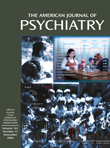Overlap Between Alexithymia and Asperger’s Syndrome
To the Editor: It seems to us that there is a significant overlap between alexithymia and Asperger’s syndrome. The term “alexithymia” was coined by Sifneos in 1972. It is derived from the Greek, with alexi meaning “no words” and thymia meaning “mood or emotion.” Patients with alexithymia have great difficulty or are unable to describe their feelings and can have problems making sophisticated differentiation of one feeling from another. Their communicative style shows markedly reduced or absent symbolic thinking (1). As Warnes (2) pointed out, they have “a paucity of fantasies” and “lack the capacity for introspection.” They are preoccupied with the “minute detail of external events…[and] are unable to make connections between events, affective arousal and somatic response.” Nonverbally, they are “stiff and wooden.” They are “mechanical in their object relations.” Alexithymic individuals give flat, shallow descriptions of others that lack “psychological counters” (2).
All of these features also fit descriptions of Asperger’s syndrome (3), in which the main difficulties are understanding one’s own and others’ emotions, having problems expressing oneself with nonverbal behavior and in reading that of others, and having a propensity for hypochondriacal features. They also have difficulty with the “theory of mind” and in predicting the cognitions of others. Their imagination is limited. They tend to have a preoccupation with factual information and are strong in areas such as mathematics, engineering, and computers but can have significant problems with interpersonal relationships.
It appears to us that from a clinical perspective a diagnosis of Asperger’s syndrome should be considered in patients with alexithymia.
1. Taylor GJ: Alexithymia: concept, measurement, and implications for treatment. Am J Psychiatry 1984; 141:725–732Link, Google Scholar
2. Warnes H: Alexithymia—clinical and therapeutic aspects. Psychother Psychosom 1986; 46:96–104Crossref, Medline, Google Scholar
3. Asperger H: Die “Autistischen Psychopathen” im Kindesalter (1944), in Autism and Asperger Syndrome. Edited by Frith U. Cambridge, UK, Cambridge University Press, 1991, pp 37–92Google Scholar



